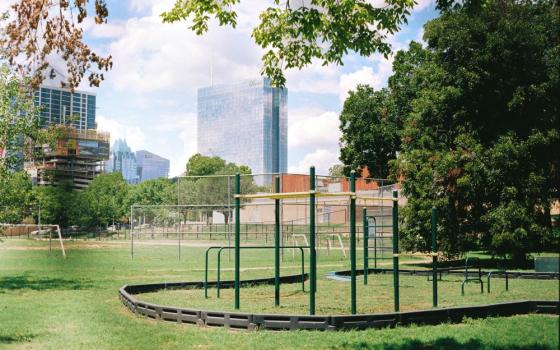Cardinal Michael Czerny, prefect of the Dicastery for Promoting Integral Human Development, is greeted at the Saint Jean nonprofit health center in Cotonou, Benin, during his trip to the West African nation Jan. 17-20, 2024. During his visit to the health center Jan. 18, Czerny met with the staff who provide much needed medical services for the people of the tiny African country neighboring Nigeria on the east, Togo and Burkina Faso on the west. (OSV News/courtesy Dicastery for Promoting Integral Human Development)
The prefect of the Dicastery for Promoting Integral Human Development has warned that humanity is in danger of "losing its home" as the world continues to reel from the effects of climate change.
Cardinal Michael Czerny made the comments Jan. 20 in Cotonou, Benin, during a roundtable on the Green Church Program, an initiative of the Archdioceses of Cotonou that was launched in March 2023.
Archbishop Roger Houngbédji of Cotonou said the initiative "aims to bring about an ecological conversion among the faithful of the Catholic Church."
The archbishop said the Green Church Program is a concrete response to the many appeals to "preserve our common home, the Earth," as contained in two of Pope Francis' documents: the encyclical "Laudato Si', On Care for Our Common Home" and the apostolic exhortation Laudate Deum ("Praise God").
"The place of ecology in the Catholic Church is a very important part of the church's service and ministry to mankind," Czerny told OSV News, and underscored the need to protect the Earth because "man is in danger of losing his home."
Advertisement
In Cotonou, Czerny said in his speech that the church in Benin has chosen to reach out directly or indirectly to families, parishes, dioceses, schools and universities, care and health care structures, lay movements, the economic sector and religious circles as potential waste producers and energy consumers. But, at the same time, "they are concerned by the quest to achieve sustainable development goals, including the fight against poverty ... hunger and universal access to drinking water," Czerny said.
The Green Church Program was inspired by the Songhai Regional Center, an agricultural model that was set up in Ouando, a neighborhood of Porto Novo, Benin, which was set up by Nigerian Dominican Fr. Godfrey Nzamujo almost 40 years ago.
Founded in 1985, Songhai, named after the prestigious West African empire of the 14th century, is a training farm that promotes agricultural entrepreneurship and sustainable farming practices, converting waste to wealth.
Nzamujo, the center's director, has been a professor at the University of California in Irvine and associate professor of engineering at Loyola Marymount University in Los Angeles.
Cardinal Michael Czerny, prefect of the Dicastery for Promoting Integral Human Development, center, speaks Jan. 20, 2024, in Cotonou, Benin, during a roundtable on the the Archdioceses of Cotonou's Green Church Program. At left is Archbishop Roger Houngbédji of Cotonou. (OSV News/courtesy Dicastery for Promoting Integral Human Development)
The Dominican priest had seen images of drought and famine in Ethiopia in the 1980s, and he was outraged at the thought of Africa being portrayed as a continent from where nothing good could ever come. He set out to change the picture, establishing the Songhai center as a showpiece of agro-ecology.
Archbishop Houngbédji said the Green Church Program, modeled after the Songhai center is "a program that has its roots in the church," citing documents from various popes that have to do with the care of the Earth.
Czerny said carrying the Green Church Program through to the end will require "mobilization and ownership by the population."
"This is also where synergy between church and state is needed. The church could be of service to the state and the population through its teaching and research institutions, such as the Catholic University of West Africa," he said Jan. 20.
The cardinal said the Green Church Program would rely on "environmental education," particularly about waste management. But this education, he explained, would include training pastoral agents and those working in diocesan structures about "environmental, and ecological promotion, highlighting the promotion of renewable energies, and the ecological development of diocesan spaces and structures to combat climate change."
Cardinal Michael Czerny, prefect of the Dicastery for Promoting Integral Human Development, center, celebrates Mass Jan. 19, 2024, in Saint-Michel Church in Cotonou, Benin. The cardinal visited Benin Jan. 17-20. (OSV News/courtesy Dicastery for Promoting Integral Human Development)
Houngbédji said that it would be "a religious aberration, a real denial of faith" for anyone to pretend to love God and at the same time "destroy his creation, the work that he himself found very good."
"And that's why, ultimately, the Green Church Program aims to invite all Christians, and by extension all people of goodwill, whether believers or not, to an ecological conversion, a dignified and responsible attitude towards the environment, our common heritage," the archbishop said.
Czerny was visiting Benin Jan. 17-20. On Jan. 18, he was welcomed at a nonprofit health center, Saint Jean, in Cotonou, where he met with the staff who provide much needed medical services for the people of the tiny African country neighboring Nigeria on the East, Togo and Burkina Faso on the West.
Czerny met separately with the bishops of Togo and Benin to discuss the challenges facing each local church. He urged during Mass Jan. 19 in Cotonou's Saint-Michel Church, that "the Synod on Synodality invites us to walk together, to journey together, to live in communion, in common participation in Christ's mission, in common discernment that enables us to find and welcome God's will."
In a region marked with religious-based violence, especially in neighboring Nigeria, Czerny said: "May our faith be a leaven of peace, love and justice."







